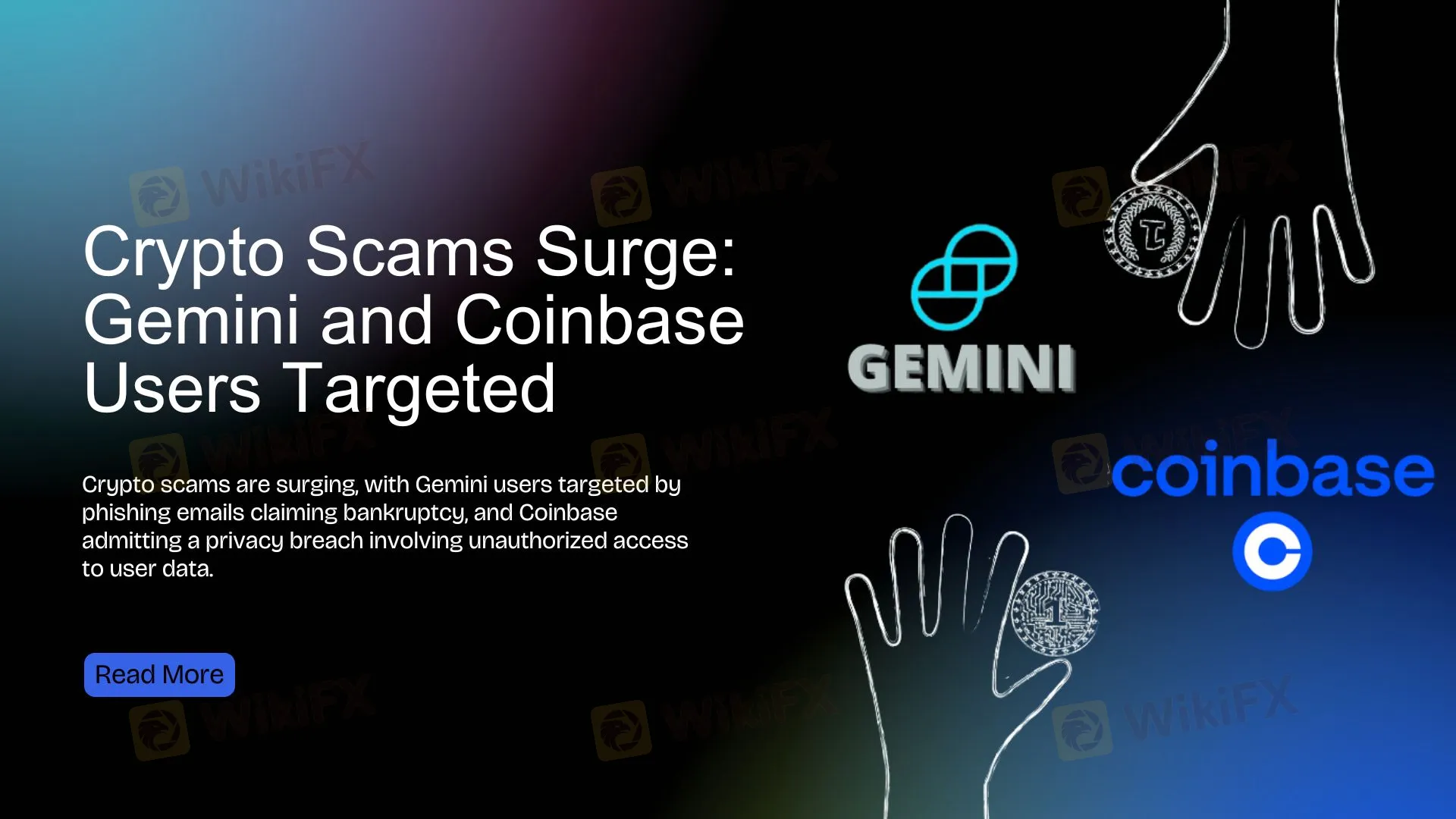简体中文
繁體中文
English
Pусский
日本語
ภาษาไทย
Tiếng Việt
Bahasa Indonesia
Español
हिन्दी
Filippiiniläinen
Français
Deutsch
Português
Türkçe
한국어
العربية
Crypto Scams Surge: Gemini and Coinbase Users Targeted
Abstract:Crypto scams are surging, with Gemini users targeted by phishing emails claiming bankruptcy, and Coinbase admitting a privacy breach involving unauthorized access to user data.

Fraudulent Emails Spread False Bankruptcy Claims About Gemini
In recent days, crypto users have reported receiving fraudulent emails falsely claiming that the cryptocurrency exchange Gemini had filed for bankruptcy. The phishing emails instructed recipients to withdraw their funds to a specified Exodus wallet address, providing a seed phrase to complete the process.
The emails alleged that Gemini had suffered losses of $1.2 billion and urged users to transfer their assets to protect their funds. Security experts have identified this as a classic phishing scam targeting inexperienced investors, attempting to trick them into sending their cryptocurrency to wallets controlled by scammers.
Gemini has issued an official warning on its platform, confirming that it will never request users to transfer crypto assets to external wallets. The exchange urged customers to verify information through official channels and avoid engaging with suspicious emails or links.
Coinbase Employee Accessed User Account Data Without Authorization
In a separate but related development, Coinbase disclosed a privacy breach involving one of its customer service employees. The employee was found to have accessed user account information without proper authorization.
Coinbase acknowledged the incident in an official communication to affected users. The company noted that the breach raised concerns about potential phishing attacks and fraudulent communications targeting Coinbase customers.
The disclosure followed reports from users who noticed an increase in phishing emails and scam phone calls impersonating Coinbase representatives.
Phishing Attacks Highlight Growing Risks in Crypto Industry
The incidents involving Gemini and Coinbase come amid a broader increase in crypto-related scams, as fraudsters seek to exploit the industrys rapid growth and rising retail participation.
Security analysts emphasize that users should remain vigilant, avoid sharing sensitive information, and use only official websites or verified apps when managing cryptocurrency accounts. The attacks also underline the growing importance of internal controls within exchanges to prevent privacy violations and protect user data.
As the adoption of digital assets expands, the crypto sector faces heightened security challenges, requiring both platform operators and users to exercise caution against evolving scam tactics.
Disclaimer:
The views in this article only represent the author's personal views, and do not constitute investment advice on this platform. This platform does not guarantee the accuracy, completeness and timeliness of the information in the article, and will not be liable for any loss caused by the use of or reliance on the information in the article.
Read more

Using Any of These Illegal Forex Trading Apps? Stop Before It Turns into a Crisis
The Reserve Bank of India (RBI) has listed out some illegal forex apps India. Read this article to know some of those apps.

5 Reasons to Stay Away from Core Prime Markets
The Forex market is a very unpredictable, complex, and risky place. There are many brokers that appear genuine but can steal your hard-earned money. So, staying alert is the only way to survive in this dynamic environment. Therefore, in this article, we are sharing 5 warning signs about Core Prime Markets.

Think Before You Trade! Unlicensed Brokers List Inside
The French regulator AMF has issued a warning against five unlicensed brokers. Investors are encouraged to verify the list to protect themselves from fraud.

Citibank Sued in $20M Romance Scam Tied to Fraudulent Transfers
Citibank faces a lawsuit over a $20M romance scam. Plaintiff alleges the bank enabled fraud by failing to block suspicious transfers.
WikiFX Broker
Latest News
Asian chip stocks rise after Nvidia reclaims title of the world's most valuable company
Nvidia's comeback sparks a rally in Asian chip stocks
CNBC Daily Open: Despite all the uncertainty, the S&P 500 is flirting with record highs — strange times
PU Prime and AFA Announce Partnership at Madrid Event
eToro UK Launches 4% Stock Cashback Card: Earn Up to £1,500 Monthly
EBC Expands ETF CFD Offering & Copy Trading Education Partnership
Gold Prices Continue to Fall as Israel, Iran Agree on Ceasefire
China steps up push to internationalise the yuan as global dollar dominance wavers
Multibank Group Offices: Global Presence and Contact Info
ESMA Proposes Reporting Reforms That Could Cut Costs for Forex Brokers
Currency Calculator


